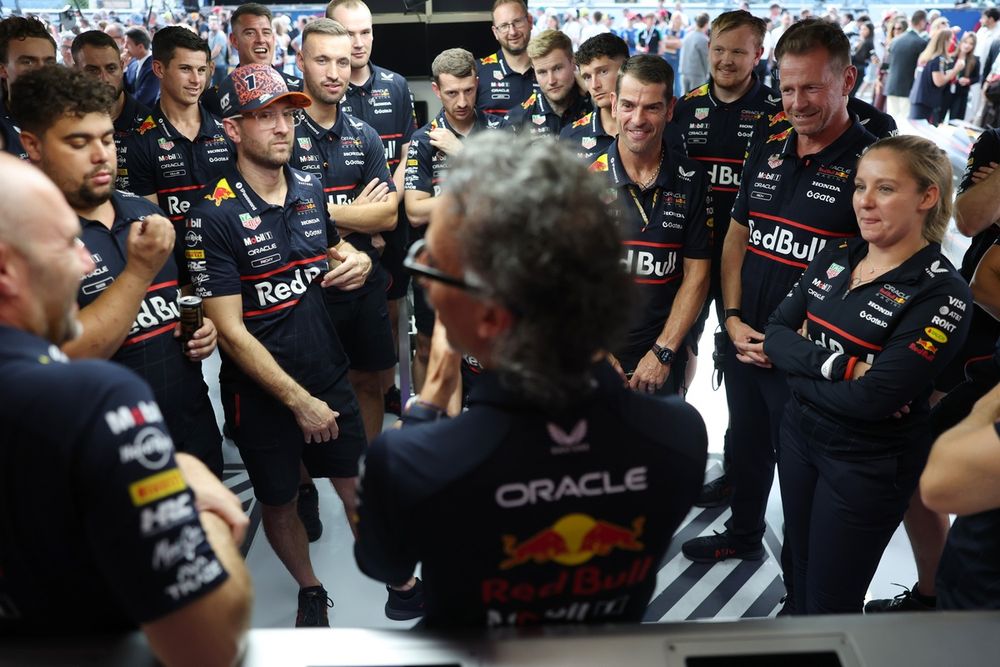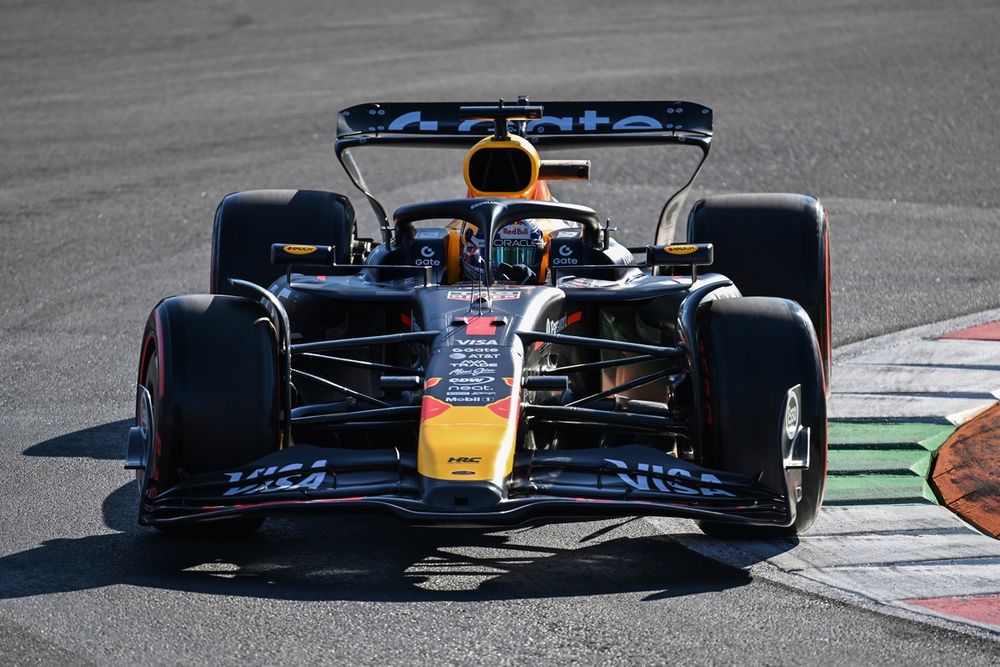Following Formula 1’s Italian Grand Prix, won by Red Bull’s Max Verstappen, both advisor Helmut Marko his driver were quick to praise new team principal Mekies.
Marko stressed that Red Bull no longer blindly followed the simulator, calling it part of a “new philosophy”. Verstappen added that Mekies asked the right questions throughout the race weekend, a crucial aspect in communication with both drivers and engineers.
The French team principal himself, however, dismissed any suggestions of his contribution to Verstappen’s third win of the season – the first since Christian Horner’s dismissal. When asked about his personal influence on the Monza success, Mekies replied: “The answer is a very easy one, the level of my contribution is zero.”
Laughter ensued from the journalists in Red Bull’s hospitality area, but Mekies doubled down: “And I’m not joking either. It’s 1,500 people working on making the car faster, so these are the talents that make the car faster, that make the hundredths and the thousandths [of lap time], and that make the set of options with the new components available. So the short answer is that my contribution is zero.”
Pressed again on the same subject, Mekies once more refused to embellish his own role. In his view, the credit belongs to the team and Verstappen, who played an important role in sticking with the low-downforce set-up – even by Monza standards. “Our only role is to make sure that the talents that we have are put in the right conditions to express that talent at best. That’s the only thing we are doing, so that’s the extent of the contribution. That’s it, nothing more.”

Laurent Mekies, Red Bull Racing Team Principal
Photo by: Mark Thompson / Getty Images
How much did Mekies really influence Red Bull’s Monza win?
Although humility is commendable, Mekies’ role was greater than he suggests. The positive remarks from Marko and Verstappen didn’t come out of nowhere.
The nuanced story is that part of Red Bull’s improved performance at Monza had long been in the pipeline – in fact dating back to Verstappen calling the car “a monster” the year before – while another part was down to execution, and in that respect, partly down to Mekies.
The first factor involved both the RB21’s package and its set-up. Last year, there was much talk about Red Bull lacking a dedicated low-downforce rear wing for Monza, but this year the team did have one. It underlines how determined Red Bull was to get its revenge after last year’s disappointment.
In addition to that Monza package, lessons were learned from the wrong set-up choice in 2024 as well. Both Marko and Horner admitted that Red Bull had run the wrong wing levels last year – something the team did not repeat.
“You do a lot of things only for Monza. You do wings only for Monza, you do set-up only for Monza, so last year was a very difficult point and the guys did an amazing job analysing last year and coming here with very specific solutions. It seems like they overshot the target – meaning the car was actually in a much better window compared to the other tracks,” Mekies explained.

Max Verstappen, Red Bull Racing
Photo by: Sam Bagnall / Sutton Images via Getty Images
Those aspects had been in the works long before Mekies was promoted, so he had no direct influence there. But a distinction must be made between car development and the operational side of things – as Verstappen pointed out. “The car this year is simply what it is,” he said on Thursday, making clear that Mekies cannot work miracles in that area. But operationally, details can change – and according to team insiders, that’s gradually happening.
Mekies’ background is valuable in that regard, as Verstappen acknowledged on Sunday night: “With Laurent having an engineering background, he’s asking the right questions to the engineers – common-sense questions – so I think that works really well.” A team boss without that technical background cannot challenge the technical department to the same extent, which also explains the trend of more engineers being promoted to the top role – Andrea Stella at McLaren, James Vowles at Williams, Ayao Komatsu at Haas, and now Mekies at Red Bull.
A second factor is that with Mekies in charge, Red Bull tries to rely a bit more on driver feedback rather than purely on numbers, as Marko explained in the paddock: “Now the idea is to take whatever the simulation shows us, but mix that with the experience that Max has and with the experience that our racing engineers have. They are not blindly taking what the simulation says.”
Listening more to the driver was clearly seen in Monza when Verstappen insisted on sticking with the low-downforce set-up heading into qualifying. “Whilst it looked a lot more difficult to get the balance right with that lower downforce level, Max has been very strong and good at pushing us to keep it on the car and to find other solutions to give him the balance back. The guys have done an amazing job in managing that,” Mekies recalled.
The team opted for other set-up adjustments instead of adding more wing, and it turned out to be the right call. Verstappen deserves credit for it, but so does Mekies: the triangle of driver, team boss, and technical department worked well in Monza. Part of that comes down to communication – precisely the area Verstappen and Marko have been most positive about so far.
Looking for harmony after the internal power struggles?
Mekies’ modest response is also interesting in light of Red Bull’s internal power struggles in the past 20 months. Part of the issue was that the ‘Austrian camp’ felt Horner was trying to gain too much power in multiple areas of Red Bull’s racing operations. The narrative toward the Thai shareholders was partly that he, as the long-serving team boss, was a key figure behind Red Bull’s success.
While that is true to an extent given Horner’s remarkable 20-year track record (eight drivers’ titles and six constructors’ championships), Mekies’ has so far chosen the opposite attitude. He refused to overstate his role – and indeed even downplayed it, at least in Monza. Such modesty goes down well with certain parts of the squad after turbulent months.

Laurent Mekies, Red Bull Racing Team Principal
Photo by: Mark Thompson / Getty Images
It was also notable that technical director Pierre Wache was sent to the podium. In essence, Mekies could have gone himself for his first win as team boss, but instead Wache – who has come under more public pressure than before, due to the car’s weaknesses – was pushed forward. Involving everyone in the success and sharing the spotlight fits with the approach so far. Wache visibly enjoyed his podium visit, even when meeting some reporters behind the Red Bull garage after the ceremony, with champagne still on his glasses.
This kind of ‘people management’ should not be underestimated in modern F1. It also fits a broader trend of engineers at the helm. Stella at McLaren likewise puts the team in the limelight and always avoids claiming any credit himself. Whether Red Bull can follow a path similar to McLaren more structurally remains to be seen. A lot will depend on its own power unit for 2026, and as Mekies has already admitted, that remains “a Mount Everest to climb”. But in Monza, the new direction that Red Bull wants to follow has at least delivered a small and unexpected moment of success, and that morale boost could prove important.
All things considered, Mekies’ contribution was certainly more than zero – but it is both admirable and, in a way, smart that he chose not to say so himself on Sunday night.
In this article
Be the first to know and subscribe for real-time news email updates on these topics

